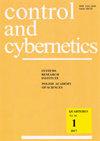Social choice, stable outcomes and deliberative democracy
Q4 Engineering
引用次数: 1
Abstract
Abstract It has turned out that all voting rules fail on some intuitively plausible desiderata. This has led some political scientists to argue that the notion of the will of the people is profoundly ambiguous and the absence of voting equilibria a generic state of a airs. As a constructive remedy to this some authors have introduced the idea of deliberative democracy. This view of democracy has much to recommend itself, most importantly the emphasis on individuals in devising the decision alternatives. Some empirical evidence also suggests that the deliberative institutions provide an escape from some of the most notorious incompatibility results in social choice theory. We shall critically examine this suggestion. The view emerging from this examination is that social choice theory and deliberative democracy are complementary, not competing approaches to democratic decision making.社会选择、稳定结果和协商民主
事实证明,所有的投票规则都不符合某些直觉上看似合理的愿望。这导致一些政治学家认为,人民意志的概念是非常模糊的,投票平衡的缺乏是一种普遍的状态。作为一种建设性的补救措施,一些作者提出了协商民主的概念。这种民主观点有很多可取之处,最重要的是强调个人在制定决策选择时的重要性。一些经验证据还表明,审议制度提供了一种逃避社会选择理论中一些最臭名昭著的不相容结果的方法。我们将严格审查这个建议。从这一研究中得出的观点是,社会选择理论和协商民主是相互补充的,而不是相互竞争的民主决策方法。
本文章由计算机程序翻译,如有差异,请以英文原文为准。
求助全文
约1分钟内获得全文
求助全文
来源期刊

Control and Cybernetics
工程技术-计算机:控制论
CiteScore
0.50
自引率
0.00%
发文量
0
期刊介绍:
The field of interest covers general concepts, theories, methods and techniques associated with analysis, modelling, control and management in various systems (e.g. technological, economic, ecological, social). The journal is particularly interested in results in the following areas of research:
Systems and control theory:
general systems theory,
optimal cotrol,
optimization theory,
data analysis, learning, artificial intelligence,
modelling & identification,
game theory, multicriteria optimisation, decision and negotiation methods,
soft approaches: stochastic and fuzzy methods,
computer science,
 求助内容:
求助内容: 应助结果提醒方式:
应助结果提醒方式:


